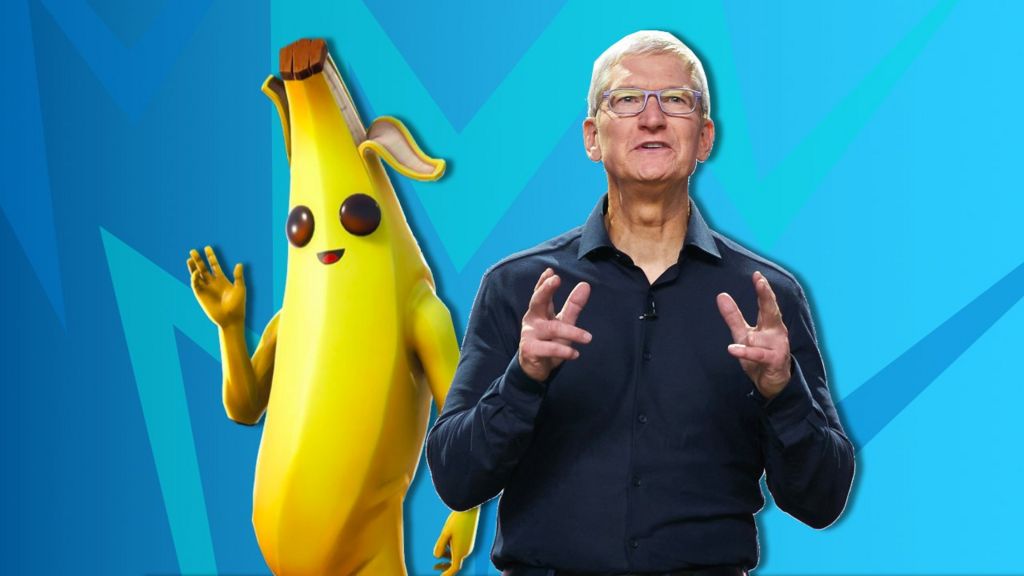Apple’s boss Tim Cook is on the witness stand in the high-profile legal row with Epic Games.

image copyrightEpic Games/EPA
Apple boss Tim Cook is taking the witness stand for the first time in his company’s major legal battle with Epic Games over an alleged monopoly.
Epic, maker of the hit video game Fortnite, claims Apple’s tight control over iPhone apps hurts competition.
During his appearance, Mr Cook argued that keeping control of the App Store helped keep iPhones secure.
He also said he did not know if the App Store made a profit, telling the court Apple did not break down the figures.
Facing questions about the level of profit the App Store generates from the 30% commission it takes on sales, he said: “We don’t have a separate profit and loss statement for the App Store.”
Instead, he said that he had a “feeling” that it was profitable – but could not share figures with the court.
Mr Cook was being questioned about his oversight of top-level decisions around the App Store’s policies.
His opposite number in the case – Epic Games chief Tim Sweeney – has already appeared on the stand in the opening days of the long-running legal battle.
Two main things are at the centre of the case: the 30% commission Apple takes on in-app purchases, and the fact that no other app stores are allowed to exist on the iPhone and iPad to offer an alternative.
Epic’s Fortnite is one of the most popular games in the world and makes its money through in-game purchases of character costumes and other digital items.
A 30% cut on millions of such purchases adds up to a lot – but Apple’s rules forbid the company from circumventing its payment methods if a sale is made in the iPhone app.
In August last year, Fortnite offered players a 20% discount if they paid Epic Games directly, in direct violation of Apple’s rules.
Apple quickly removed the app from its store – as did Google, which enforces a similar policy.
Epic had clearly expected that to happen. The firm immediately launched a PR blitz to mobilise its fanbase and win support, painting Apple as a dominating force suppressing freedom of choice.
Within hours, Epic lodged pre-prepared legal complaints in the US against both Apple and Google.
But the debate goes beyond the 30% cut, to wider questions about competitiveness. Epic has made no secret of the fact that it would like to run its own app stores on both iOS and Android, avoiding Apple’s and Google’s payment and delivery systems entirely.
The legal cases against Apple and Google are separate, and Apple has been the first in court.
Apple is accused of running a monopoly, subjecting all apps to a cumbersome review process, and rejecting them for all sorts of reasons. Epic contends that is unfair, while Apple says it protects customers from dodgy apps.
Much of the early debate has been over definitions, with Epic arguing that Fortnite is more than a game, but rather a “metaverse” within which all sorts of experiences – including concerts and film screenings – are held.
But outside of the wrangling over technical definitions, there have also been some significant revelations.
The fact that Epic’s model for its app store is not yet profitable is one of Apple’s arguments against allowing an open system.
Documents have revealed that Epic has made heavy losses with game giveaways, which cost it millions of dollars. However, in return it has gained millions of new users for its PC gaming platform – the Epic Games store – which Epic says was always its strategy.
It has also emerged that Apple has debated lowering the 30% cut it takes in response to competition, with App Store chief Phil Schiller writing to Steve Jobs as long ago as 2011.
And one particularly memorable exchange was born out of a debate over adult content.
Apple had highlighted that Epic’s store hosted a store-within-a-store – Itch.io – which sells adult content. Apple gave this as an example of why it did not want third-party stores on its platforms.

image copyrightGetty Images
Later, while showing images of Fortnite, Apple’s legal team referred to Peely, a Fortnite character who is a banana.
It showed him in a tuxedo, remarking: “We thought it better to go with the suit than the naked banana, since we are in federal court this morning.”
On cross-examination, Epic’s attorney wanted to put to bed the “implication” that a naked banana might be inappropriate, resulting in Epic’s marketing boss informing the court: “It’s just a banana, ma’am.”